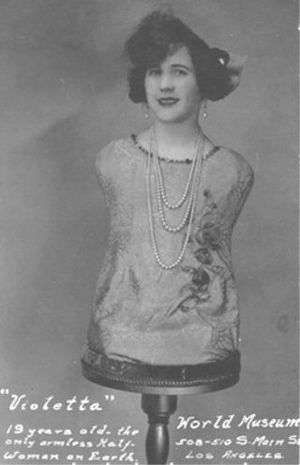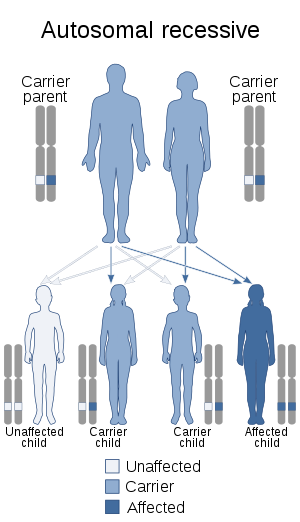Tetra-amelia syndrome
Tetra-amelia syndrome (tetra- + amelia), also called autosomal recessive tetraamelia,[1] is an extremely rare autosomal recessive[2] congenital disorder characterized by the absence of all four limbs. Other areas of the body are also affected by malformations, such as the face, skull, reproductive organs, anus and pelvis.[1] The disorder is caused by mutations in the WNT3 gene.[2]
| Tetra-amelia syndrome | |
|---|---|
| Other names | Autosomal recessive tetraamelia |
 | |
| Violetta, a performer from the 1920s with tetra-amelia syndrome | |
Presentation
Tetra-amelia syndrome is characterized by the complete absence of all four limbs. The syndrome causes severe malformations of various parts of the body, including the face and head, heart, nervous system, skeleton, and genitalia.[1] In many cases, the lungs are underdeveloped, which makes breathing difficult or impossible. Because children with tetra-amelia syndrome have such serious medical problems, most are stillborn or die shortly after birth.
Cause

WNT3 gene
Researchers have found a mutation in the WNT3 gene in people with tetra-amelia syndrome from one large family. This gene is part of a family of WNT genes that play critical roles in development before birth. The WNT3 gene is located at human chromosome 17q21.[3]
The protein produced from the WNT3 gene is involved in the formation of the limbs and other body systems during embryonic development. Mutations in the WNT3 gene prevent cells from producing functional WNT3 protein, which disrupts normal limb formation and leads to the other serious birth defects associated with tetra-amelia syndrome.
Genetics within families
In some affected families, the cause of tetra-amelia syndrome has not been determined. Some researchers believe that unidentified mutations in WNT3 or other genes involved in limb development may be responsible for the disorder.
In most of the families reported so far, tetra-amelia syndrome appears to have an autosomal recessive pattern of inheritance.[1][2] This means the defective gene responsible for the disorder is located on an autosome (chromosome 17 is an autosome), and two copies of the defective gene (one inherited from each parent) are required in order to be born with the disorder. The parents of an individual with an autosomal recessive disorder both carry one copy of the defective gene, but usually do not experience any signs or symptoms of the disorder.
Epidemiology
Tetra-amelia syndrome has been reported in only a few families worldwide. According to a 2011 study by Bermejo-Sanchez, amelia – that is, the lacking of one or more limbs – occurs in roughly 1 out of every 71,000 pregnancies.[1]
People with tetra-amelia syndrome

- Joanne O'Riordan of Millstreet, Cork, Ireland. At the age of 16 she addressed the United Nations in New York. She appeared before the International Telecommunication Union’s conference ‘Girls in Technology’, receiving a standing ovation after delivering the keynote speech.
- Hirotada Ototake
- Nick Vujicic, founder of Life Without Limbs.[6]
- Prince Randian
- Violetta (entertainer)
- Kent Bell (1965-2015) of Jacksonville, FL, scoreboard operator and disabled rights advocate, appeared on Oprah Winfrey show and in numerous print articles over the course of his life.
- Rob Mendez, JV football coach at Prospect High School (Saratoga, California).[7]
- Christian Arndt of Germany, media presenter.
References
- Online Mendelian Inheritance in Man (OMIM): 273395
- Niemann, S.; Zhao, C.; Pascu, F.; Stahl, U.; Aulepp, U.; Niswander, L.; Weber, J.; Muller, U. (Mar 2004). "Homozygous WNT3 Mutation Causes Tetra-Amelia in a Large Consanguineous Family". The American Journal of Human Genetics (Free full text). 74 (3): 558–563. doi:10.1086/382196. PMC 1182269. PMID 14872406.
- Online Mendelian Inheritance in Man (OMIM): 165330
- Overcoming hopelessness | Nick Vujicic | TEDxNoviSad, retrieved 2019-08-15
- "TED Prize winner Sugata Mitra to speak at conference in Kuala Lumpur". The Star Online. 2013-11-12. Retrieved 2019-08-15.
- VUJICIC, NICK. "Life Without Limbs // Nick Vujicic". Life Without Limbs. Retrieved 2019-07-30.
- "Rob Mendez has never held a football. Who says he can't be a head coach?". ESPN.com. Retrieved 2019-02-16.
External links
| Classification |
|---|
- "Tetra-amelia syndrome - Genetics Home Reference". U.S. National Library of Medicine. Retrieved 2009-01-09.